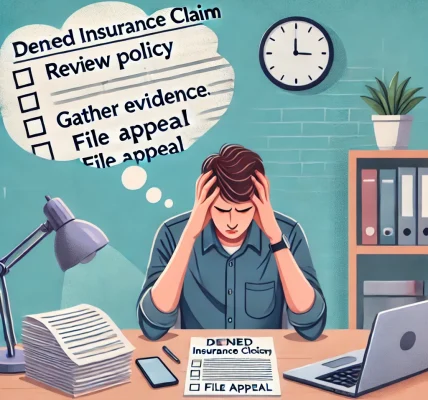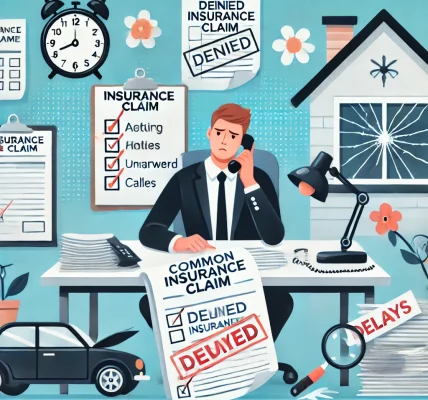Filing an insurance claim can be a complex and stressful process. Whether it’s for health, auto, home, or business insurance, policyholders often face challenges in getting a fair settlement. However, by understanding the right strategies and avoiding common pitfalls, you can legally maximize your insurance claim payout.
In this guide, we will walk you through effective, ethical, and legally sound ways to ensure you receive the compensation you rightfully deserve.
1. Understand Your Insurance Policy Thoroughly
Before filing a claim, it’s crucial to understand the terms and conditions of your insurance policy. Many claim denials or reduced payouts happen because policyholders are unaware of coverage limitations, exclusions, and deductible amounts.
How to Avoid Issues:
- Read your policy document carefully and clarify any doubts with your insurance provider.
- Look for specific coverage limits and exceptions.
- Understand the claim filing deadlines and procedures.
2. Report the Claim Promptly
Delaying your claim can weaken your case and reduce your chances of getting a full payout. Most insurance companies have specific time limits within which claims must be reported.
Best Practices:
- Report the claim as soon as possible.
- Keep a record of all communication with your insurance company.
- Request a claim reference number for future tracking.
3. Document Everything with Evidence
Providing clear and strong evidence can significantly impact the success of your claim. Insufficient or missing documentation is one of the most common reasons claims get denied or underpaid.
What to Document:
- Take photos and videos of the damage or incident.
- Keep copies of receipts, invoices, and repair estimates.
- Get written statements from witnesses if applicable.
- Save copies of emails and letters exchanged with your insurer.
4. Provide Accurate and Complete Information
Filing incorrect or misleading information can delay your claim or even lead to denial. Always be honest and provide precise details about the incident.
How to Stay Compliant:
- Double-check all forms before submission.
- Do not exaggerate damages or injuries, as this can lead to legal issues.
- If you are unsure about any details, consult a professional before filing.
5. Work with a Public Adjuster for Complex Claims
If your claim is significant or complex, consider hiring a public adjuster. They work independently from the insurance company and help ensure you receive a fair settlement.
Why a Public Adjuster Helps:
- They assess the damage accurately.
- They negotiate with the insurance company on your behalf.
- They ensure all necessary documentation is submitted correctly.
6. Get Multiple Estimates for Repair Costs
Insurance companies often offer lower settlements based on their internal estimates. To ensure you receive fair compensation, obtain multiple repair estimates from reputable contractors.
How to Use Estimates to Your Advantage:
- Present at least two to three independent repair quotes.
- Request a detailed breakdown of the costs.
- If the insurance company’s estimate is too low, negotiate using your collected quotes.
7. Keep a Personal Claim Journal
Maintaining a claim diary helps track important details about your case. This can be useful if there are delays, disputes, or appeals.
What to Record:
- Dates and times of all conversations with your insurer.
- Names of the insurance representatives you spoke with.
- Details of any promises or statements made.
8. Negotiate Before Accepting the First Offer
Insurance companies often start with a low initial offer, expecting policyholders to negotiate. Do not rush into accepting the first payout unless you have reviewed it thoroughly.
Negotiation Tips:
- Politely question any lower-than-expected payout.
- Use your evidence and repair estimates to justify a higher settlement.
- Be persistent but professional in your approach.
9. Avoid Social Media Discussions About Your Claim
Many people unknowingly weaken their claim by discussing their case on social media. Insurance companies monitor online activity and may use your posts against you.
How to Protect Yourself:
- Do not post photos or updates related to your claim.
- Avoid discussing details of the accident or incident publicly.
- Ask friends and family not to tag you in related posts.
10. Appeal if Your Claim Is Denied or Underpaid
If your claim is denied or undervalued, you have the legal right to appeal the decision. Many policyholders don’t realize that they can challenge an unfair decision and end up settling for less than they deserve.
How to Appeal Successfully:
- Request a written explanation for the denial or low payout.
- Gather additional supporting evidence to strengthen your case.
- Submit a formal appeal letter with proper documentation.
- Consider seeking legal advice if necessary.
11. Consult a Lawyer for Complex Cases
For high-value claims or disputes, seeking legal counsel can be beneficial. A lawyer with expertise in insurance law can help ensure you receive a fair settlement.
When to Consider a Lawyer:
- If your claim is wrongfully denied.
- If your insurer is delaying the process unfairly.
- If you suspect the company is acting in bad faith.
Conclusion
Maximizing your insurance claim payout legally requires a combination of preparation, documentation, and negotiation skills. By following these steps, you can ensure that you receive the full compensation you are entitled to without breaking any laws or engaging in unethical practices.
Key Takeaways:
✔ Understand your insurance policy in detail.
✔ Report claims promptly and keep thorough records.
✔ Provide accurate, complete, and documented evidence.
✔ Negotiate your settlement and do not accept the first offer.
✔ Seek professional help when necessary (public adjusters, lawyers).
Being well-informed and proactive is the best way to maximize your insurance claim payout legally. If you follow these strategies, you will be in a strong position to receive the compensation you deserve. 🚀




